
Rensselaer Polytechnic Institute is a private research university in Troy, New York. It is the oldest technological university in the English-speaking world and the Western Hemisphere. It was established in 1824 by Stephen Van Rensselaer and Amos Eaton for the "application of science to the common purposes of life".

Biochemical engineering, also known as bioprocess engineering, is a field of study with roots stemming from chemical engineering and biological engineering. It mainly deals with the design, construction, and advancement of unit processes that involve biological organisms or organic molecules and has various applications in areas of interest such as biofuels, food, pharmaceuticals, biotechnology, and water treatment processes. The role of a biochemical engineer is to take findings developed by biologists and chemists in a laboratory and translate that to a large-scale manufacturing process.
Peter G. Schultz is an American chemist, entrepreneur, and nonprofit leader. He is the CEO and President and Professor of Chemistry at Scripps Research, the founder and former director of GNF, and the founding director of the California-Skaggs Institute for Innovative Medicines, established in 2012. In August 2014, Nature Biotechnology ranked Schultz the #1 top translational researcher in 2013. Schultz's contributions to the field of chemistry have included the development and application of methods to expand the genetic code of living organisms, the discovery of catalytic antibodies, and the development and application of molecular diversity technologies to address problems in chemistry, biology, and medicine.
Rahul Sarpeshkar is the Thomas E. Kurtz Professor and a professor of engineering, professor of physics, professor of microbiology & immunology, and professor of molecular and systems biology at Dartmouth. Sarpeshkar, whose interdisciplinary work is in bioengineering, electrical engineering, quantum physics, and biophysics, is the inaugural chair of the William H. Neukom cluster of computational science, which focuses on analog, quantum, and biological computation. The clusters, designed by faculty from across the institution to address major global challenges, are part of President Philip Hanlon's vision for strengthening academic excellence at Dartmouth. Prior to Dartmouth, Sarpeshkar was a tenured professor at the Massachusetts Institute of Technology and led the Analog Circuits and Biological Systems Group. He is now also a visiting scientist at MIT's Research Laboratory of Electronics.
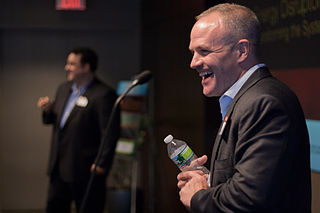
Jay D. Keasling is a professor of chemical engineering and bioengineering at the University of California, Berkeley. He is also associate laboratory director for biosciences at the Lawrence Berkeley National Laboratory and chief executive officer of the Joint BioEnergy Institute. He is considered one of the foremost authorities in synthetic biology, especially in the field of metabolic engineering.

The Shirley Ann Jackson, Ph.D. Center for Biotechnology and Interdisciplinary Studies is a research facility at Rensselaer Polytechnic Institute (RPI). The 218,000-square-foot (20,300 m2) building is located on 15th Street between RPI’s Playhouse and Academy Hall, next to the Center for Industrial Innovation. The institute hopes the new facility will help to encourage collaboration between experts in different fields, allowing them to solve problems that they would be unable to solve alone. The current director of the center is Juergen Hahn, succeeding Deepak Vashishth, Jonathan Dordick, and Robert Palazzo. The building cost $100M.

The Manchester Institute of Biotechnology, formerly the Manchester Interdisciplinary Biocentre (MIB) is a research institute of the University of Manchester, England.
Daniel I-Chyau Wang was a Chinese-American chemical engineer. He was an Institute Professor at the Massachusetts Institute of Technology. He was known for founding the MIT Biotechnology Process Engineering Center and the expansion of the field of biochemical engineering.
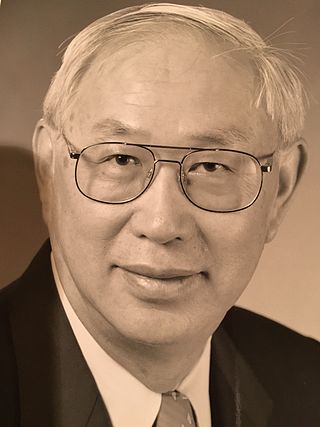
Van C. Mow is a Chinese-born-American bioengineer, known as one of the earliest researchers in the field of biomechanics.
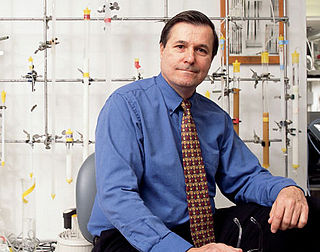
Robert J. Linhardt is the Ann and John Broadbent, Jr. '59 Senior Constellation Professor Biocatalysis & Metabolic Engineering at Rensselaer Polytechnic Institute.
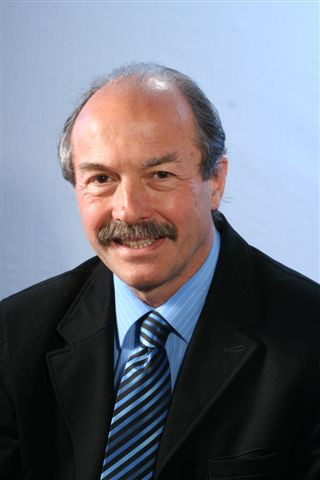
György Kéri was a Hungarian biochemist, professor and Doctor of Biological Sciences (D.Sc.). His major field of research was signal transduction therapy and he participated in the development of novel drug discovery technologies and drug candidates that entered the clinical development process.
Wei-Shou Hu is a Taiwanese-American chemical engineer. He is currently the Distinguished McKnight University Professor of Chemical Engineering and Material Science at the University of Minnesota.
Alan J. Russell, is Vice President of Biologics for Amgen, one of the world’s leading Biopharmaceutical companies. Until 2020, Alan was the Highmark Distinguished Career Professor and Director of the Disruptive Health Technology Institute at Carnegie Mellon University. From 2013 through spring of 2016 he was also the Chief Innovation Officer, Allegheny Health Network.

Nigel Shaun Scrutton is a British biochemist and biotechnology innovator known for his work on enzyme catalysis, biophysics and synthetic biology. He is Director of the UK Future Biomanufacturing Research Hub, Director of the Fine and Speciality Chemicals Synthetic Biology Research Centre (SYNBIOCHEM), and Co-founder, Director and Chief Scientific Officer of the 'fuels-from-biology' company C3 Biotechnologies Ltd. He is Professor of Enzymology and Biophysical Chemistry in the Department of Chemistry at the University of Manchester. He is former Director of the Manchester Institute of Biotechnology (MIB).

Pierre Monsan is a French biochemist and entrepreneur. He is currently Professor emeritus at the Institut national des sciences appliquées de Toulouse and the founding director of the pre-industrial demonstrator Toulouse White Biotechnology (TWB).
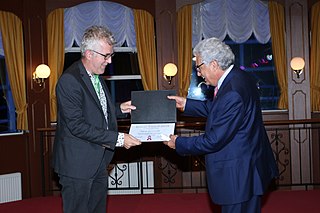
Marco Wilhelmus Fraaije is a Dutch scientist whose research concerns enzymology of redox enzymes, enzyme discovery & engineering and biocatalysis at the Groningen Biomolecular Sciences and Biotechnology Institute (GBB) at the University of Groningen.
Jerome Schultz is an American bioengineering researcher, professor, and university administrator. He is a fellow of several national scientific societies and a member of the National Academy of Engineering. He has held professorships at the University of Michigan, the University of Pittsburgh, University of California, Riverside, and he is currently a Distinguished Professor of Biomedical Engineering at the University of Houston.
David W. Wood is an American chemical engineer who is professor of chemical and biomolecular engineering at Ohio State University. Wood is also associated with the Department of Chemistry and Biochemistry and Molecular Biophysics Training Program.

Blake A. Simmons is an American chemical engineer, entrepreneur and an academic. He is an adjunct professor at the University of Queensland, and the University of Hawaiʻi at Hilo, the division director for biological systems and engineering at Lawrence Berkeley National Laboratory, and the chief science and technology officer at the Joint BioEnergy Institute.












